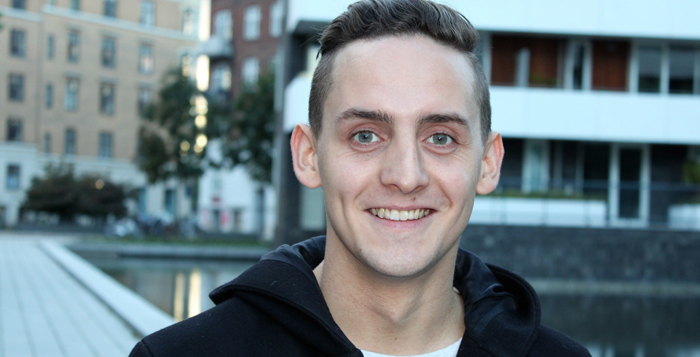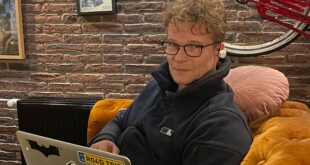Daniel Mierzwinski is 26 years and runs the successful Instagram-startup Sponsta. But before his success, he hit rock bottom. Hear how he picked himself up and how the experience has given him a whole new outlook on life.
“I have always had a great passion to create,” says the 26-year-old product manager in Sponsta when we begin the interview.
“Not consciously in the way that I knew one day I would jump into entrepreneurship. But this creating something yourself, put on your own signature, has always attracted me. “
When he thinks back, he can see that it is something that has followed him through his days as a DJ for family celebrations and playing Counter-Strike in primary school.
“I always ended up making all thess additional activity by myself. When I played Counter-Strike, I made the site of the clan, and when I mixed the music, I did things like the logo, website, and business cards, etc. That was my thing. I have always had a passion for creating things, “says Daniel.
From an early beginning at 17
Daniel Mierzwinski grew up in Solrød, Denmark. After high school, he attended Roskilde Technical School, where as part of his studies he was hired as an intern at the advertising agency Vertic. It was here that he had his first experience with programming websites for major brands.
His first task was to free newspaper Urban, who wanted to create a deal site. He was awarded the job the first week he was at work and had full responsibility.
“A thrilling task for a boy of 17,” he says with a smile. But he took it in stride and executed it well. He continued to have assignments with a lot of responsibility for major brands.
Creative urge and responsibility
The job at Vertic gave him great experience, but was not enough to satisfy his need to do something he could put his own stamp on.
In the same period, he began to hang out with a group of boys in the Copenhagen party scene that a friend had introduced him to. They organized parties, but lacked someone who could create websites and promotional materials. Over a period of two years, it was Daniel’s gig. Besides his work at Vertic, he built websites and made promotional videos, logos, business cards, and flyers for the group.
“I was like their guy. The man who was responsible for working with the promotion. And it was cool because I got free reign. I was allowed to take control right from the start, “says Daniel.
Part of the elite
Meanwhile, he was hired as a developer at a different advertising agency, In2media – and the new environment caught him completely off-guard.
“People were proficient at a whole different level. They were superstars. So it was a very motivating place to work. I really felt I was come to the right place, “says Daniel.
Here he met Robin Nowicki, who did many of the things that Daniel had always wanted to do. He was the digital planner in In2media.
“We were good friends, and I became more and more interested in what he was doing. I started to move more and more in his direction. But then…”
He leans back and take a deep breath.
“I went to prison.”
“Suddenly, everything crumbled between my hands”
He takes a sip of his water and explains.
“My friends from town were not a healthy influence. That I can see today. But I got a lot of recognition for the things I did for them – websites and so on. And then there was probably someone who saw that my skills could also be used for other things, “says Daniel.
“Then one day I was asked if I could make a copy of a passport for them. It was said very casually, but I felt challenged to solve the task. I asked why, they said that I should not worry about it – but I would get a Macbook for it.”
A passport becomes a license becomes a .. .
The situation escalated as one assignment lead to another. The passports became drivers licenses, and soon, Daniel was caught.
“I kept doing it because I somehow had become ‘hooked’. The first time making it opened a whole new world for me. I got a lot of recognition that I had not had before. Suddenly I was cool because I could do that; I gave them a lot of opportunities. It meant a lot to me at the time,” he says, adding:
“I was 20 at the time.”
Daniel was arrested by two police officers while he was at work in In2media. He remained in custody for a month.
“It all crumbled in my hands,” says Daniel.
When you’ve hit bottom, there are only two options
“When I was released, my greatest hope that I could come back and work at In2media. One of the first thing I did was to take a walk on the lakes and have a long talk with my old boss. He is a very likeable type. I will never forget him.“
Although it was a good conversation, Daniel could not keep his job. “It was quite understandable,” says Daniel.
He therefore went back to the office to say goodbye to his old colleagues, and explain to them what had happened. He wanted to be honest. The experience was tough. Especially since he said goodbye to friends and a job that meant a lot to him.
“I had lived a double life the last two years and had to explain to my parents, friends, and colleagues why I had done it, without even fully understand how it could go so far. At the same time, I have to figure out what I would do with my life.”
He had two options. Either he could continue in the same path that led him to prison, or he could wipe the slate clean and start over. He chose the latter.
He would rather make every effort to start over and take responsibility for his life, then go back to prison.
Hyper Island bails him out
“I consulted with my old friend from In2media, Robin, who pushed me in the right direction. He suggested that I could start at Hyper Island, where he had gone. It is a creative business education based in Sweden, which is aimed at the digital advertising industry. He said that it was here that he had learned what he could, and I decided that it was what I should do.”
It was completely different than anything he had ever tried before. There were no books, no characters, no real teachers or classrooms. It’s a school where you learn through practice: working with real clients in real tasks.
Here he unlearned an old lesson from elementary school: that there is only one correct answer. There were many different solutions; it was all about what you could vouch for.
“You could say it was a bit a healing process for me,” explains Daniel.
Because of the school’s strong focus on creating and think independently, Daniel slowly began to get interested in the startup world. For his internship during his last semester, he chose to seek out a startup. He ended up at German Vamos, an event-service company with headquarters in Berlin.
“It was a place I really growing, me because there was so much new information to take in,” says Daniel. “After that, I knew that startups was something for me.”
Returning to Denmark
After seven months in Berlin with his internship, his education came to an end, and Daniel returned to Denmark.
He formed an overview of the Danish startup scene and began to seek out and work with the people who could help him to create his own business.
After numerous meetups and freelance jobs at various companies, he slowly learned the environment, and was confident to start something himself. His idea was IDEAID, a non-profit hackathon for a good cause. The team he assembled, consisted in part of Phillip Bock, whom he knew from the marketing agency Constellation.
“We could feel that we were really effective together, Phillip and me. There was really good energy between us. So almost as soon as people had left the hackathon, and prizes had been presented, we looked each other in the eyes and said, ‘it can’t stop here’,” laughs Daniel.
3 days later, they created Sponsta.
If it makes you unhappy, why do you do it?
Just two years ago, Daniel had never thought that he would get to where he is today. He had no network, no plan, and felt that he still had a long way to go. But slowly he dove deeper and deeper into the startup scene and closer to the people who could help him.
So what will happen now, I ask him. He laughs.
“When I had my last internship interview at Vamos in Berlin, my boss asked me about the same thing: What now. Back then, I said, within 2 years, I will have my own company. At that time it was mostly of wishful thinking. But it ended up that I did it. “
The plan now is to enjoy the journey he’s on and continue to improve in what he does.
“I think that’s a good place now. The life I lived before was full of stress and surprises that I had no control over. Now I choose my way in life, rather than letting life lead me. Now I do the things that gives me real value and don’t just feel good in the moment. That’s what life is all about, “he says with a smile.
He looks thoughtfully into the air and adds:
“I’ve got a chance to have an impact on a lot of things now. I have a vision that the work I create must come out of love. It may sound a little hippie-like, but I think I’ve spent enough time sitting in an office with people who were engrossed in work that they actually did not like, to know that doing that will not make someone happy. So a big part of my future vision for my own business is to attract people who believe in it and will help to create a positive environment. Of course, one must be a global company, and have big ambitions, but it must not be at the expense of happiness,” says Daniel.
“Otherwise, why do it?”.
 Nordic Startup News Early Stage Startup News From The Nordics
Nordic Startup News Early Stage Startup News From The Nordics




